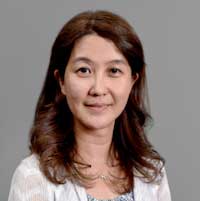When you click on a sponsoring school or program advertised on our site, or fill out a form to request information from a sponsoring school, we may earn a commission. View our advertising disclosure for more details.
Biomedical diagnostics is the study of the procedures, equipment, and products used to diagnose disease and ensure that they meet all the regulatory requirements. Biomedical diagnostics programs delve into various elements of the field, including the business, science, and application of diagnostics and the technology used to carry out the process. There are various online master’s programs in biomedical diagnostics that train students in medical product development and regulation.
Students taking up biomedical diagnostics study courses across various disciplines, including engineering, biomechanics, biomedical measurement and instrumentation, pharmaceuticals, surgery, medical imaging, and genetics. The programs typically comprise 30 credits and can be completed within a year.
Upon completing the program, students can pursue various avenues such as physiology, imaging, surgery, drug design, clinical rehabilitation, and pharmaceuticals.
The following guide profiles exceptional biomedical diagnostics programs and three notable faculty members teaching them.
Featured MS Programs in Biomedical Diagnostics
The International School of Biomedical Diagnostics at Arizona State University offers an online master of science (MS) in biomedical diagnostics that can be completed entirely online, either part-time or full-time.
To get admitted to the program, students must have a bachelor’s or master’s degree from a regionally accredited college or university, a minimum GPA of 3.0, official transcripts, two letters of recommendation, and proof of English proficiency.
The 30-credit program gives students a thorough understanding of the regulatory, business, legal, and technological aspects of biomedical diagnostics. Students delve into courses in biomedical informatics, health economics, policy and payment models, the regulation of medical diagnostics, biomedical device design, and molecular diagnostics. The program teaches students how diagnostics influence every aspect of healthcare, including pharmaceutical and technology development, patient management, healthcare finance, and healthcare policy.
At the end of the program, graduates can seek out career opportunities in clinical laboratory support and management, quality systems, regulatory affairs, sales management, and account management.
- Location: Tempe, AZ
- Accreditation: Higher Learning Commission of the North Central Association of Schools and Colleges
- Tuition: $829 per credit
- Program length: 12 months
University of Southern California
The University of Southern California’s Viterbi School of Engineering has an online master of science program in medical device and diagnostic engineering. The program helps students understand diagnostic techniques and medical devices, including medical product regulation. The fully online program gives students access to the same faculty and curriculum as its on-campus counterpart.
Admissions requirements for the program include an undergraduate degree in engineering, math, or hard science from a regionally-accredited university, a satisfactory undergraduate GPA, and GRE test scores.
The 28-credit program explores topics in biomedical systems, advanced mechanical design, studies of the nervous system, biomedical measurement and instrumentation, signal and systems analysis, advanced mechanical design, and physiological control systems. Students delve into techniques and concepts related to medical devices and diagnostic imaging.
The program prepares students to pursue opportunities in fields such as medical imaging, clinical and rehabilitation engineering, biomaterials, orthopedic surgery, drug design and delivery, and systems physiology.
- Location: Los Angeles, CA
- Accreditation: Senior College and University Commission of the Accrediting Commission for Schools, Western Association of Schools and Colleges
- Tuition: $2,137 per credit
- Program length: 1.5 to three years
George Washington University offers an online master of science in health sciences (MSHS) degree in molecular diagnostic sciences. The program helps students develop the skills they need to solve complex molecular diagnostics problems.
Students applying to the program must have a 3.0 GPA in a scientific bachelor’s degree from a regionally accredited institution and submit a personal statement, a resume, two letters of recommendation, official transcripts, and TOEFL scores (if they are international students).
The 35-credit program provides students with a foundational understanding of molecular biology and biotechnology. Some of the courses included in the curriculum are microbial pathogenesis, biostatistics for clinical and translational research, laboratory management and operations, medical biotechnology, molecular biology, and molecular pathology. Students learn how to research, implement and evaluate methods of transport and collection, develop preventive maintenance programs, and conduct correlations in molecular science.
The program can open up opportunities for graduates in public health firms, diagnostic molecular laboratories, pharmaceutical companies, research institutions, biotechnology firms, or government agencies. Graduates can take up varied roles as molecular laboratory scientists, biotechnology or government research associates, and public health laboratory scientists, among other positions.
- Location: Washington, D.C.
- Accreditation: Middle States Association of Colleges and Schools
- Tuition: $990 per credit hour
- Program length: 24 months
Michigan State University offers three online programs in biomedical laboratory diagnostics: a master of science in clinical laboratory science, a master of science in biomedical laboratory operations, and a master of arts in biomedical laboratory science. All degrees provide students with a strong foundation in the latest research and systems in biomedical diagnostics.
Admission requirements include a bachelor’s of science, with a minimum 3.0 GPA, official transcripts, three letters of recommendation, a letter of intent or purpose statement, a brief resume, and GRE scores (which can be waived).
The biomedical laboratory science degree consists of 30 credits. Some courses include biomedical laboratory diagnostics, communication in the sciences, a molecular pathology laboratory, and managing biomedical laboratory operations. In the end, students must also complete a capstone project. The biomedical laboratory operations degree comprises 31 credits and includes a curriculum similar to the master of arts in biomedical laboratory science.
- Location: East Lansing, MI
- Accreditation: Higher Learning Commission
- Tuition: $1,654 per credit
- Program length: 10 to 12 months
Rutgers School of Health Professions
The Rutgers School of Health Professions offers an online master of science in biomedical informatics program that trains students to make a valuable contribution to the field of biomedical informatics.
Admission requirements include a bachelor’s degree from an accredited institution in the U.S. or its equivalent, a minimum GPA of 3.0, three letters of recommendation, official transcripts, a personal statement, a resume, and TOEFL scores for international students. GRE scores are not required.
The 36-credit program offers students the option to specialize in hospital management informatics, clinical informatics, public health informatics, and bioinformatics. They take courses in biomedical informatics, healthcare information systems, biomedical informatics, controlled medical terminology, drug discovery informatics and design, and health analytics.
At the end of the program, graduates can pursue roles as managers, scientists, educators, specialists, and researchers in various healthcare settings such as hospitals, laboratories, healthcare facilities, pharmaceutical companies, and private and governmental agencies.
- Location: Newark, NJ
- Accreditation: Middle States Commission on Higher Education
- Tuition: $1,244 per credit
- Program length: 24 to 60 months
University of Northern Colorado – Extended Campus
The University of Northern Colorado- Extended Campus offers an online biomedical science master’s degree program. This program is specifically designed for students pursuing additional studies in medicine, pharmaceuticals, or a biomedical-related PhD program. Completing this intensive program can help improve students’ MCAT test scores as well as help boost their applications to other graduate degree programs.
This two-semester program can be completed in less than a year. Topics covered include molecular genetics, developmental biology, immunology, cell physiology, and virology. To graduate from this program, students must pass a comprehensive exam covering the core coursework material. While classes are offered entirely online, students will be studying alongside on-campus students and must complete online activities with fellow students.
- Location: Loveland, CO
- Accreditation: Higher Learning Commission (HLC)
- Tuition: $609 per credit
- Program length: Two semesters
Missouri Online College of Veterinary Science
The master’s degree in biomedical sciences through Missouri Online College of Veterinary Science can be completed entirely online in as little as nine months. This program was created as a multidisciplinary degree to help prepare graduates for additional studies. There is a strong emphasis on developing robust research skills that will help students prepare for a career in medicine, teaching, or biomedical research.
In addition to innovative seminars, students take physiology, cell biology, and neuroscience classes. There are no thesis requirements, and students only need to complete 30 credits to earn this degree. Missouri Online offers online education for four Missouri institutions, affording students access to affordable and flexible education across the state.
- Location: Columbia, MO
- Accreditation: Higher Learning Commission (HLC)
- Tuition: $620.30 per credit
- Program length: Nine months
Professors to Know in Biomedical Diagnostics Programs

Dr. Li Liu is an assistant professor of biomedical informatics at Arizona State University. She teaches classes in biomedical informatics and modeling biomedical knowledge and oversees the internship program. Before joining ASU, she directed the core faculty of bioinformatics at the University of Florida. She is a trained clinician and bioinformatics researcher.
Dr. Liu’s research team is currently involved in examining molecular and clinical signatures in human disease. She has published her work in top journals, such as Nature Methods, Molecular Biology and Evolution, and Retrovirology.
Dr. Liu earned her master of science in information systems from the New Jersey Institute of Technology and her doctorate of medicine from Peking Union Medical College in China.

Dr. Bartlett W. Mel is an associate professor of biomedical engineering at the University of Southern California. He teaches courses on biomedical research, laboratory projects in biomedical engineering, an advanced overview of neuroscience, computational neuroengineering, and engineering science and systems.
Dr. Mel’s research efforts focus on neural engineering and computational neuroscience. He has published his work in prominent journals such as the Journal of Neuroscience and the Journal of Cognitive Neuroscience and Science. He also has won distinguished honors such as the NSF Career Award and National Research Service Award.
Dr. Mel completed his doctorate in computer science at the University of Illinois and his bachelor’s degree in electrical engineering and computer science from the University of California, Berkeley.

Dr. Matthew Scotch serves as an associate professor of biomedical informatics at ASU. He teaches classes on the foundations of biomedical informatics methods, the economics of medical informatics, public health informatics, and biomedical informatics.
Dr. Scotch’s research currently examines bioinformatics for public health, zoonotic disease surveillance, natural language processing, and geographical information systems. He has been published in the International Journal of Health Geographics, Bioinformatics, and PLOS Computational Biology. He also has won several laurels, including the Endeavour Research Fellowship and Best Paper Award.
Dr. Scotch has a doctorate in biomedical informatics from the University of Pittsburgh, a master of public health (MPH) from Yale University, a master’s in biomedical informatics from Columbia University, and a bachelor’s degree in health and society from the University of Rochester.
